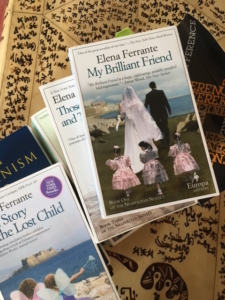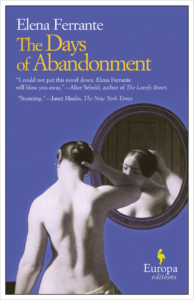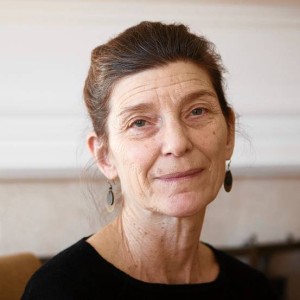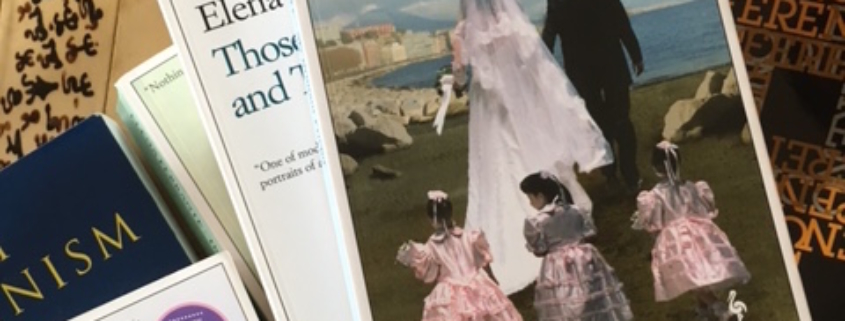On Writing Life’s Wounds: Elena Ferrante and Feminine Writing

Research for my critical paper
“Life’s wounds are incurable and you write them and rewrite them in the hope of being able, sooner or later, to construct a narrative that will account for them once and for all,” explains Elena Ferrante, the Italian author of My Brilliant Friend and the other Neapolitan novels, in one of her rare interviews.
After my father passed away, I stopped writing. Grief can be all-consuming, a vortex where feelings, thoughts, and memories get sucked in and churn about. During the sleepless nights that followed his death, I binge-watched four seasons of Breaking Bad. It was the only thing terrible enough to counter what my family had endured: a long losing battle with pancreatic cancer. The show’s segments on illness were harder to watch than the gory deaths. A corpse dissolved in a bathtub of hydrochloric acid? No problem. Walter White’s trip to the oncologist? Endless tears …
Several months later, when I began writing again, I wrote about my father. Call it catharsis or processing, perhaps. Maybe a form of gluttony: the reliving of the memories as I wrote, edited, and crafted them, as if they were still happening. Dad still somehow living on the page. The ego trying to survive intact, clutching to memories better left washed out by time. Gradually, the need to chronicle merged into my everyday. I had another baby. I began to write fiction again (all that time watching them sleep, what else are you going to do?) and decided to finally apply for an MFA.
Right after my MFA program at Antioch began, life slapped me with another series of tragedies. My first cousin was found dead in the Galapagos, a gunshot wound to her left temple. My mother and dog were injured in a home invasion. And last June, as my husband was in the midst of a psychotic break from bipolar disorder and alcoholism, as he wandered in and out of institutions, I filed for divorce. This was after I found out about his pathological lies, the jobs he never had, the finances that never existed, the past that never happened, our five-year straw relationship; after I filed emergency custody and became sole guardian of two boys, ages two and four; after his wreckage crept back against me in the form of debts, lawsuits, and liens; after I was threatened physically, filed police reports, and had extra security on my mother’s house; after he disappeared for good. I stopped writing again. I stopped reading. I took the semester off. Some nights, I lay fully clothed in the bathtub and stared at the ceiling.
The lawyers told me to stay quiet, so I was silenced by necessity, by the danger of violence and other repercussions. Mostly, it was the unknown that censored me. Later in the summer, a few bad poems trickled out as I read self-help books like The Power of Now and A Spiritual Divorce.
 I also picked up Elena Ferrante’s Neapolitan novels, which are the cleaned-up, literary versions of Breaking Bad: the melodrama, the hyperrealism, the interiority, the intense relationship between Elena Greco (Lenù) and Lila. Much like the relationship between Walter and Jessie in Breaking Bad, the Neapolitan novels pivot around this troubled friendship; the girls circle each other like buzzards. Who will destroy whom first? I read Ferrante’s other novels: Troubling Love, The Days of Abandonment, and The Lost Daughter. (N.B.: Do not read The Days of Abandonment after your husband abandons you. The protagonist, Olga, unravels over one hot summer: dog poisoned, vomiting child, locked in an apartment with no way out, character on the precipice of a breakdown. Was I going to unravel too? The possibilities were real.)
I also picked up Elena Ferrante’s Neapolitan novels, which are the cleaned-up, literary versions of Breaking Bad: the melodrama, the hyperrealism, the interiority, the intense relationship between Elena Greco (Lenù) and Lila. Much like the relationship between Walter and Jessie in Breaking Bad, the Neapolitan novels pivot around this troubled friendship; the girls circle each other like buzzards. Who will destroy whom first? I read Ferrante’s other novels: Troubling Love, The Days of Abandonment, and The Lost Daughter. (N.B.: Do not read The Days of Abandonment after your husband abandons you. The protagonist, Olga, unravels over one hot summer: dog poisoned, vomiting child, locked in an apartment with no way out, character on the precipice of a breakdown. Was I going to unravel too? The possibilities were real.)
When I returned to my MFA program, I decided to write a critical paper on Ferrante, hoping to unpack her feminist ideology, find survival between the lines, or something like that. Strange idea. Even after reading the Neapolitan novels, her three earlier novels, a plethora of interviews and articles, and several books on 1970s feminism, revisiting Jacques Derrida, and writing thirty pages for a critical paper, I am still neck-high in Ferrante and wondering what the hell has happened to my life.
Elena Ferrante’s books are indebted to second-wave feminism, particularly Continental writers like Hélène Cixous and Luce Irigaray and, in Italy, the Milan Women’s Bookstore Collective led by Luisa Muraro. In Ferrante, you can read the ideological traces of difference feminism and écriture féminine (feminine writing). Cixous’s écriture féminine highlights how patriarchal structures have entrapped women’s language. In her 1975 seminal article, “The Laugh of the Medusa,” Cixous writes, “Woman must write her self: must write about women and bring women to writing, from which they have been driven away as violently as from their bodies …Woman must put herself into the text—as into the world and into history—by her own movement.” Writing from the female body, writing about women, writing outside of traditional forms are means of reclaiming a buried voice (or as Ferrante also calls it, female alienation-inclusion).
Ferrante does this with ease. She writes too much. Her female characters write too much. There are 1700 pages of the Neapolitan tetralogy, from My Brilliant Friend to The Story of the Lost Child, and Ferrante has three previous novels with similar characters, themes, metaphors, and plot lines, such as abandonment, jealousy, patriarchal oppression, class violence, female friendship, maternal ambivalence, petty scheming, self-esteem problems, boyfriend troubles, to name just a few. Her female characters are tumble-dried by the men in their lives: bamboozled, impregnated, and abandoned, others beaten, exhausted, and dried up. Even though there is something self-defeating about her women, their voices have a radical urgency. Ferrante writes and rewrites life’s wounds.
To complicate things, Elena Ferrante is a pseudonym. The author has removed herself from the story, which is both fascinating and annoying. (Why does she get to be mysterious Ferrante while we are all still stuck being ourselves?) In interviews, Ferrante says the reader must extract the author’s shape from the text itself. From this action of searching (and never finding), the reader becomes engaged in the work.

Here’s a picture of Ferrante’s translator, Ann Goldstein, instead.
In Ferrante’s work, there is very little redemption; instead, a glut of epistemological questions abound. How can we translate knowledge? How can we exist, write, and know? Can we ever approximate truth, or does writing always keep us at arms-length from the object of inquiry? Who the hell is Elena Ferrante? There are the feminist questions, too. Are our words captured through a patriarchal lens? Are we even aware of our own entrapment? In fairness, I had not pondered these questions in regards to my own writing before.
Will I always remain arms-length from the real, like Lenù who has left Naples, her friends, her old neighborhood, who fashions her stories from their lives with exploitative drive? For all Lenù has studied and written, what does this protagonist know in the end? Without spoiling the Neapolitan novels, the answer is not much. While I still have much to learn about my own narrative, I have to reconcile a certain futility as well. Because in the real world, outside of books and dreams, what you know has real consequences. I can write circles around the events surrounding my cousin, mother, and missing ex-husband. Yet this will not bring me closer to my cousin’s killer or my mother’s attackers, nor closer to knowing the truth about my ex-husband. Writing will not resurrect my father. Perhaps by writing I can process these things, but I cannot hope to solve them. Writing my grief is neither a means to an end nor a conscious feminist liberation. Yet, the opposite— silence—is impossible, be it from lawyers, advisors, friends, family, or the systemic suppression of the female voice (too whimsical, too domestic, too emotional). As a female writer, I am almost lucky that while my story has violence, it lacks the trappings of sentimentality. I was advised (by a man) that my divorce saga would make a great screenplay, but would I consider killing off a character in the end?
In Vanity Fair, Ferrate says, “I hold that male colonization of our imaginations—a calamity while ever we were unable to give shape to our difference—is, today, a strength. We know everything about the male symbol system; they, for the most part, know nothing about ours, above all about how it has been restructured by the blows the world has dealt us.”
Ferrante has translated what she has witnessed or experienced—her personal knowledge—into the fictional realm, perhaps driven by a necessity to cure her own wounds. Just like the texts I wrote about my father, just like my mediocre poems, just like the tentative beginnings I make writing about divorce, I write because, like Lenù in the Neapolitan books, I cannot help myself. Is it some brave feminist thing? Only insofar as everything I say, do, or touch is feminist by my very nature. For me, feminism happens whether I want it to or not. I may not resolve life’s wounds, I may not escape patriarchal forms, I may never know anything, but I’ve built up a healthy store of “fuck its.” So fuck it, let’s write.
Now, the question is, how to translate this with the same brilliance as Ferrante.
Diana Odasso is currently an MFA student at Antioch University Los Angeles and Managing Editor for Lunch Ticket. She previously served as Lunch Ticket’s Translation co-editor, and has translated French literary texts to English (published in Jim Harrison’s The Raw and Uncooked), ghostwritten for an autobiography, and blogged for the Huffington Post. She lives in South Florida with her two young boys and Boston Terrier.






